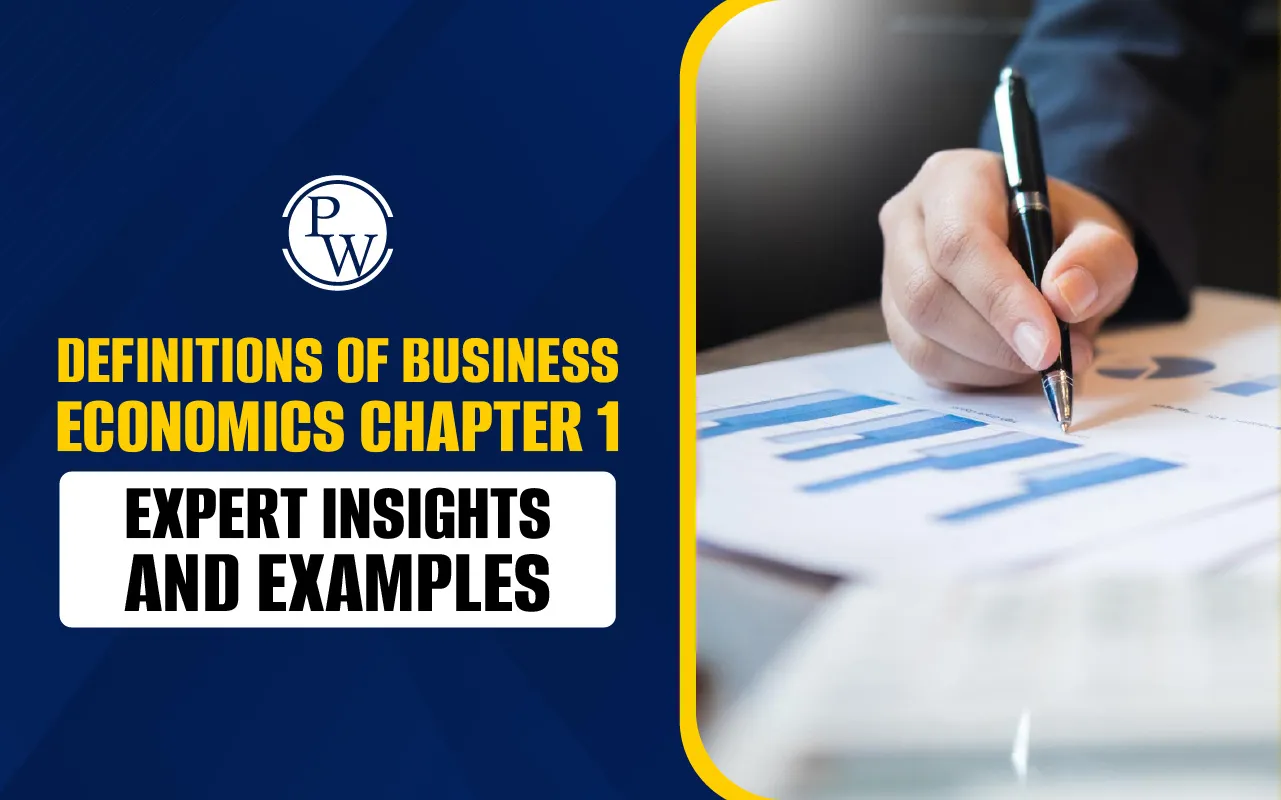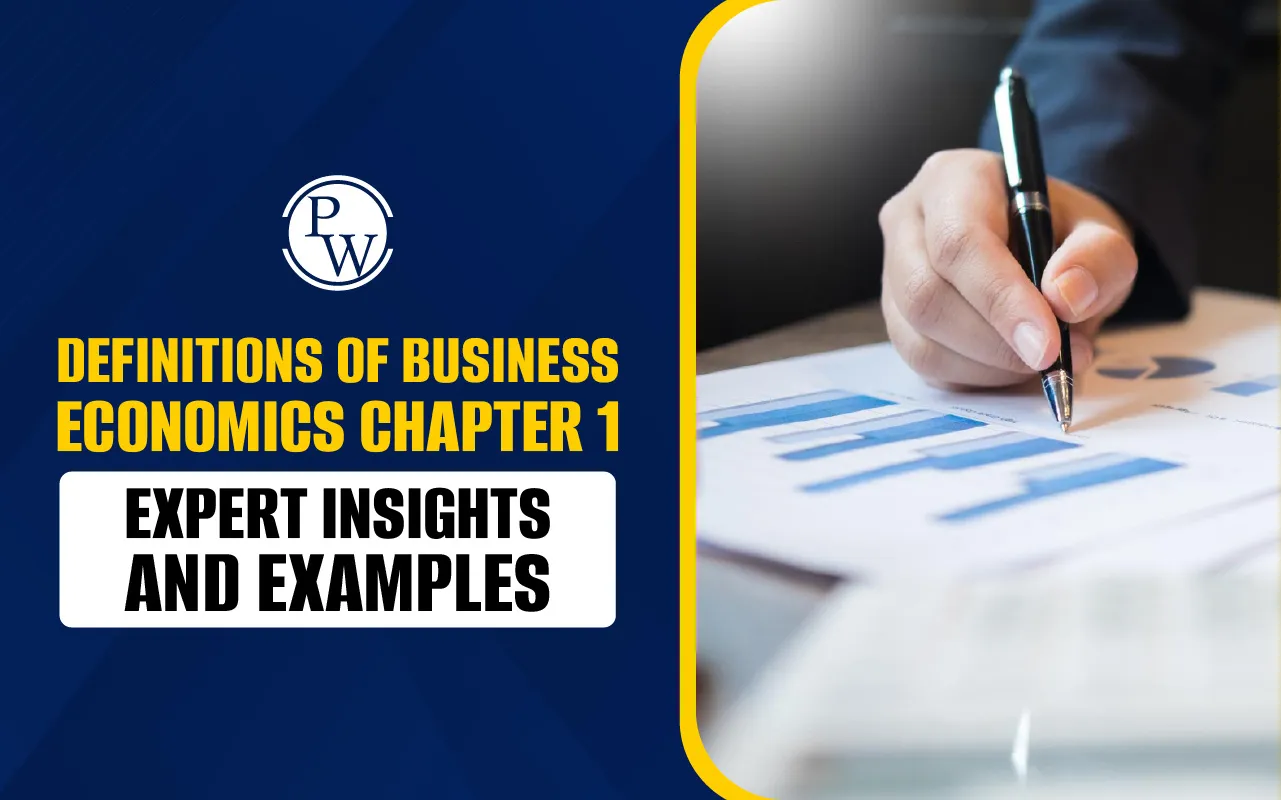

Definitions of Business Economics Chapter 1: Business Economics is an important area that helps businesses in making informed decisions. It combines economic theories with practical business applications. The study of Business Economics allows managers to understand how limited resources can be used effectively to achieve business goals.
Below, we will discuss the Definitions of Business Economics Chapter 1, provide expert insights, and share examples to make the concept easier to understand.
What is Business Economics?
Business Economics refers to the application of economic principles and analysis to business problems and decision-making. It studies how firms and organisations utilise the scarce (limited) resources to achieve objectives like profit maximisation, cost reduction, and market growth. Business Economics covers areas such as production, pricing, investment, and demand forecasting.
It also gives managers the tools and techniques to make decisions that are efficient and profitable. By understanding market behaviour and consumer patterns, managers can plan strategies that align with business goals.
Definitions of Business Economics Chapter 1
Experts have defined Business Economics in several ways. These definitions focus on their scope, purpose, and practical application in real business scenarios. Below, we’ve mentioned some various definitions of Business Economics:
| Various Definitions of Business Economics | |
| Expert | Definition |
| Joel Dean | Business Economics is the application of economic analysis in the formulation of business policies and decision-making. |
| H.L. Ahuja | Business Economics is the study of economic theories and principles that are applied to solve business problems efficiently. |
| Dominick Salvatore | Business Economics examines the behaviour of firms and consumers in different market conditions and the impact on decision-making. |
| Mark Hirschey | Business Economics focuses on applying quantitative techniques such as cost analysis, break-even analysis, and regression to support managerial decisions. |
Also, Check: SCOPE OF BUSINESS ECONOMICS CHAPTER 1
Managerial Economics vs Business Economics
Managerial Economics and Business Economics are closely related. They are different in focus and application. Understanding their differences is essential for students and professionals.
| Managerial Economics vs Business Economics | ||
| Basis | Managerial Economics | Business Economics |
| Focus | Managerial Economics is primarily concerned with the decisions made by managers to solve day-to-day business problems. It deals with planning, organising, and controlling resources within a firm. | Business Economics is a broader field that studies the application of economic principles to solve business problems. It includes strategic decision-making, policy formulation, and long-term planning. |
| Scope | Managerial Economics has a narrow scope. It focuses mainly on decisions regarding pricing, production, cost control, and profit management within a firm. | Business Economics has a wide scope. It covers both managerial issues and broader business policies, including understanding market trends, forecasting, and investment decisions. |
| Techniques | Managerial Economics uses tools like cost analysis, marginal analysis, and optimisation techniques to support managerial decisions. | Business Economics uses a combination of quantitative and qualitative techniques such as linear programming, regression analysis, and break-even analysis to aid decision-making. |
| Purpose | The purpose of Managerial Economics is to provide managers with the information and analytical tools needed to make effective decisions within the organisation. | The purpose of Business Economics is to help the firm as a whole in planning, controlling, and achieving its objectives efficiently. It integrates economic theory with practical business applications. |
Also, Check: INTRODUCTION TO BUSINESS ECONOMICS CHAPTER 1
Core Concepts in Defining Business Economics
Understanding the core concepts in defining Business Economics is essential for students and professionals. These concepts form the foundation of decision-making in businesses.
-
Scarce Resources: Businesses always operate with limited resources, including money, labour, and raw materials. Business Economics helps managers decide how to allocate these resources in the most effective way to achieve business goals. By analysing resource constraints, managers can prioritise activities that offer the maximum benefit.
-
Decision-Making: Decision-making is the core of Business Economics. It provides managers with economic tools and techniques to make informed choices. These decisions may involve pricing strategies, production planning, investment analysis, and market expansion. Using Business Economics, managers can weigh costs and benefits and choose actions that maximise the firm’s overall performance.
-
Market Behaviour: Business Economics studies the behaviour of consumers and firms in different markets. It helps managers to understand demand and supply patterns, consumer liking, and competitive forces. By analysing market behaviour, firms can develop strategies that meet customer needs while maintaining profitability.
-
Quantitative Techniques: Business Economics depends on quantitative techniques, for example, break-even analysis, regression analysis, and linear programming. These tools will give data-driven insights, help managers to forecast outcomes, judge alternatives, and make informed business decisions. Quantitative analysis makes sure that decisions are based on logical reasoning and measurable factors rather than guesswork.
Definitions of Business Economics Chapter 1 provide a clear understanding to students of how economic principles can be applied to business problems. From expert definitions, comparisons, and details into the core concepts, it becomes true that Business Economics is both a theoretical and a practical field. It provides managers with the knowledge and the tools to make decisions that can optimise the use of limited resources and help the businesses toward long-term success.
Definitions of Business Economics Chapter 1 FAQs
What is Business Economics?
How is Business Economics different from Managerial Economics?
Why are scarce resources important in Business Economics?
What are the key tools used in Business Economics?











